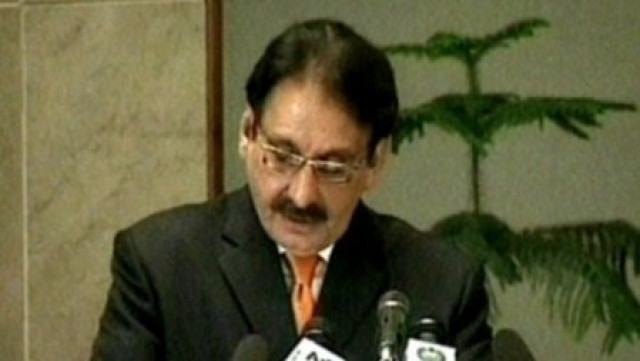18th amendment retains the dictator's legacy: CJ
17-member bench hears a number of identical petitions challenging certain provisions of the 18th amendment.

18th amendment retains the dictator's legacy: CJ
The 17-member bench was hearing a number of identical petitions challenging certain provisions of the 18th amendment, particularly the formation of the judicial commission for the appointment of judges in the superior courts.
Attorney General Maulvi Anwarul Haq informed the court that Senator Raza Rabbani was in Karachi and will appear before the bench on Wednesday.
The chief justice expressed concern over media reports regarding summoning of Senator Rabbani, chairman of the 18th amendment implementation commission. He said the apex court has not summoned him but it is his own desire to appear before the court, adding that Rabbani was one of the respondents in a petition.
Justice Asif Khan Khosa said that no constitution is permanent and it has to be amended according to the needs of the time. He said that in the past, rulers acted like monarchs and people gave them protection.
The chief justice said the civil society must struggle for an independent judiciary in Pakistan. “The judges are deep like the sea and cool like ice,” he said. He added that it should be appreciated that through the power of judicial review, courts are able to protect the rights of the downtrodden. With Article 175-A, the first casualty would be of the president, second of the chief justice and the third will be of the prime minister, as the three will not have any role in judges’ appointment, the CJ said.
Civil society’s counsel Salman Akram Raja, in support of his argument, gave references of various countries where the judges’ appointment is made through a judicial commission.
“We talk of the different mechanisms [that have] evolved in various societies but do not analyse the situation in our own country,” said Justice Khalilur Rehman Ramday, adding that there is a need to see the ground realities of Pakistan. He also said there was a need to pay attention to the situation that had developed in the country over the past three months.
Justice Ramday asked the counsel to tell the court how many countries in America and Europe have Article 63-A. “It means we don’t trust our own parliamentarians therefore Article 63A was inserted in the constitution through the 18th amendment,” he said.
Justice Tariq Pervaiz said that the concept of consultation has been taken out in Article 175-A. “In the previous system the prime minister’s role was to advise the president on judges’ appointment,” Raja said.
The chief justice said if the judicial commission’s role is nomination of a judge for the appointment in a superior court, then there is no use of it. “Nomination can be accepted or rejected,” he said. Justice Nasirul Mulk remarked that the ultimate decision will be made by the parliamentary committee.
Justice Ramday asked Raja what would happen if the judges whose nominations are rejected file a petition against the parliamentary committee in the courts.
Published in The Express Tribune, September 28th, 2010.



















COMMENTS
Comments are moderated and generally will be posted if they are on-topic and not abusive.
For more information, please see our Comments FAQ